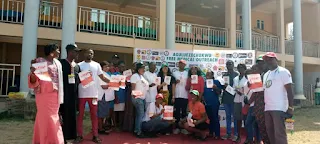 |
| Sensitisation at Ebenebe |
By Okechukwu Onuegbu
CSOs/Media Accountability and Anti-Corruption Initiative (CMAAI), has urged collaborations of women, youth and children across Anambra communities towards eliminating corruption and promoting accountability in governance.
 |
| Sensitisation at Ebenebe |
CMAAI, a coalition of civil society and media working to promote accountability, transparency and governance in Anambra, is also advocating for citizens active participation in community decision making processes for a speedy development and economic recovery.
The Team Lead, CMAAI, Ugochi Freeman made the call when the coalition engaged with women leaders (President generals women wing) from 10 communities in Awka North Local Government Area (LGA) at Ebenebe, and Aguluezechukwu community members at St. Peter's Catholic Church, Aguluezechukwu in Aguata LGA.
 |
| CMAAI engaging with Hon. Moubike of Aguata II State Constituency (Anambra State House of Assembly) Aguluezechukwu |
Freeman, who decried that corruption has eaten deep into the fabrics of the nation, urged parents to inculcate good family values into their children, support and punish their wards and children appropriately with a view to disabusing their minds from engaging in crimes and corrupt practices.
 |
| Women during sensitisation at Aguluezechukwu |
" Moral values such as honesty, integrity, and fairness are the foundation of a just and equitable society. These values are learned from a young age, and it is the responsibility of families and communities to promote them.
"The family is the first institution where children learn moral values. Parents and caregivers have a critical role to play in shaping the moral character of their children. By promoting moral values such as honesty, respect, and responsibility, families can help to build a corrupt free society," she stated.
According to her, community members have have the power to say no to corruption through reporting of corrupt practices, demanding transparency, and holding their leaders accountable since they are eyes and ears of the community.
"Corruption can take many forms, such as bribery, extortion, and nepotism. For example, a community member may be asked to pay a bribe to access a government service or a job.
"Corruption hurts our community in many ways. It can lead to poor roads, inadequate healthcare, and lack of access to education. It's like a disease that affects us all.
"To identify corruption, we need to look out for signs such as unfair treatment, favoritism, and lack of transparency. If something doesn't feel right, it's probably corruption.
"If we see or experience corruption, we should report it. We can report to the authorities, the media, or a trusted community leader. Reporting corruption is a brave thing to do. We can use tools like freedom of information laws, social media, and community meetings to promote transparency.
"These tools help us to access information and hold our leaders accountable. Transparency means being open and honest about what we do. It's like showing our community how we spend their money. Transparency helps to prevent corruption and builds trust," she added.

